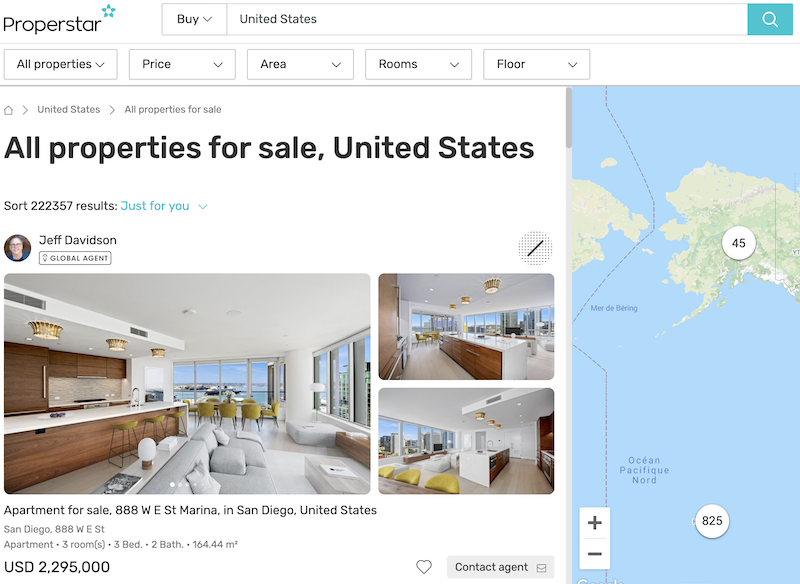
Property search process in the USA
Property search process in the USA
How to search for a new home wisely and not to lose any detail during this process? Tips from the the U.S. citizen
Table of contents
How to search for a new home wisely and not to lose any detail during this process? Tips from the the U.S. citizen
When you begin your search for a home in the U.S. as an international buyer, looking online at properties is a great place to start.
However, there’s a lot more than the home itself to think about before buying. There are subtle, yet important nuances to consider, research to do on neighborhoods and schools, safety stats to review, and critical questions to ask yourself.
Check details below so you're prepared and more confident about buying a home in the United States.
Step 1: Start by determining your budget
So, where do you want to buy? Even if you don’t know the exact neighborhood or street you want to live on, that’s ok. Start by identifying some cities in the U.S. that you’re interested in.
Then look up the median home values in that city and decide if your budget will work in that particular area. The prices of many homes in the U.S. are determined by a cost per square foot. This is a good metric to use to help you figure out how much square feet of living space you can afford.
Furthermore, a big component of your budget will be your down payment or deposit. If you put down less than 20% of the sale price, the lender’s going to charge a fee called PMI (private mortgage insurance).
The smaller the down payment, the higher the monthly PMI fee. Depending on the sale price of the home this could equate to hundreds of dollars a month. But as a foreign buyer, lenders may require a 30% deposit or more, so this extra cost may or may not apply.
 Step 2: Research the neighborhood
Step 2: Research the neighborhood
Once you’ve identified the general area and city you want to buy a home in, dig a little deeper. Find out some key statistics about the different neighborhoods in that city. Here are some examples of things to inquire about.
Key features: • Dog friendly? • Is a car needed? • Is it walkable to restaurants? • Areytards are well-kept? • Any sidewalks? • Peaceful and quiet? • Is parking easy? • Is it walkable to grocery stores? • Are the neighbors friendly? • Are streets well-lit? • Any community events? • Do kids play outside?
Also, see what restaurants and cafes are in the area, learn about the arts, entertainment, and fitness options, as well as the local grocery stores.
One resource that I really like and used in my house-hunting process is called neighborhood scout. This may help in your search and answer the detailed questions.
Another important attribute of the city to look into is the weather. There are many different climates in the U.S. Many states get snow in the winter, while some don’t. The summers in the West Coast can be hot and dry, or cool and windy if living in a coastal town. But in the Midwest and Southwest, the summers bring humidity, rain potential, and hurricanes.
Weather is important to a lot of people. Some American homebuyers make real estate purchases based on the weather conditions alone.
Join a Facebook Group To connect with locals in the prospective city, join a FaceBook group in that area. There are groups that can share insider information about the best neighborhoods, share their experience living there, how the home buying process went for them, and so much more.
Plus, you can post your own questions in the group. And you can connect with others and feel more confident in the neighborhood you’re looking to buy a home in.
Choose your destination
Step 3: Research the schools
If you have children, then finding a good school for them is a key part of the buying process. One great resource to help you learn about local schools is called greatschools.org.
When you visit this platform, you type in a city name and then the elementary, middle, and high schools in that area pop up. Each school has a rating on a scale of 1 to 10, and you can read reviews from students and their parents. Also, you can read about test scores, the demographics of the student body population, teachers and staff information, and more.
 Step 4: Search for a property
Step 4: Search for a property
Start your search by typing the name of the city. You can indicate your price range, bedrooms, baths, square feet, and much more.
When you click on a certain property, you may learn important details like its walk- and bike-ability to nearby places. This means how easy and accessible it is to walk and bike to stores and parks in the area. Also, you may learn about public transport options, how long your commute might be, and other specifics like that.
Or if you have specific requirements, don't forget to check property description thouroghly, which may include:
• Maximum HOA fees • Commute time • Fireplace, garage, hardwood floors, basement, etc. • Waterfront, ocean view, lake view, corner lot, etc. • Age of the home (by selecting a range in years) • Community amenities • Gated property
Or ask a real estate agent about all those details using the form on the property page.
 A few important tips
A few important tips
Here are some questions from a native of the U.S. to answer before or during your house-hunting process.
• Do you want to live in a single-family home in the suburbs? What about new construction vs a resale home. And what about a foreclosure property?
• Or would you prefer to live in a condominium, where your monthly Homeowners Association (HOA) fee covers expenses like the pool, tennis courts, roof maintenance, landscaping, and sometimes cable and internet services?
• Does it matter to you that you’re close to an international airport, or a diverse neighborhood with a mix of residents from all over the world?
• Would you prefer a gated community with 24/7 security, or be okay finding a safe neighborhood to live in without needing a security patrol team?
• Do you want to renovate, rebuild, or add on to your future home? If so, there could be restrictions, and permits needed before you can make changes? Some communities only approve certain exterior paint colors and limit the number of cars you can park on the street.
• Do you want a home already furnished? It’s not very common to find this, but it’s not impossible either.
These are questions to ponder and it can help to weigh the importance of each one.
Also, when buying a property, some communities and condo buildings are senior communities. They're referred to as 55 and older (55+), or housing for older persons (HOPA). So, while reading the description of the property, make sure to look for this information in case you’re not looking for a 55+ property.
There’s one more critical point to cover when looking to buy a condo, and that’s the rule on renting. Some HOA’s don’t allow you to rent/lease at all, or they say you must own your unit for 1 to 3 years before renting. While others say you must rent 180 to 365 days at a time. In this case, vacation rentals aren’t allowed.
In Summary
After doing the initial research on your own, consult with your lawyer or financial advisors (if you have one) and of course local real estate company. This way they can answer any specific questions or concerns you have to further prepare you for the buying process.
We wish you the best of luck.
 Step 2: Research the neighborhood
Step 2: Research the neighborhood Step 4: Search for a property
Step 4: Search for a property A few important tips
A few important tips